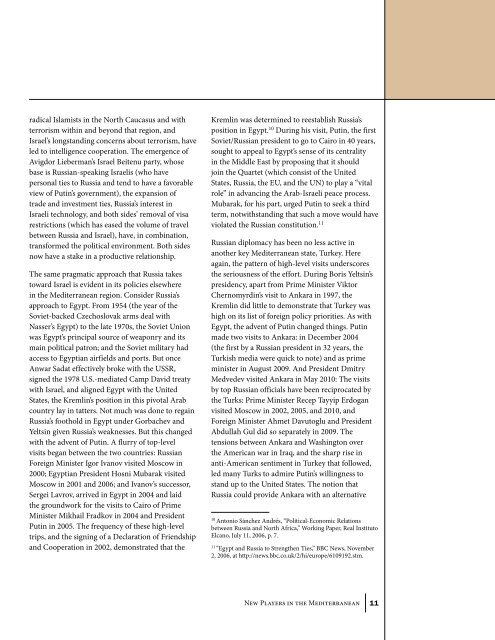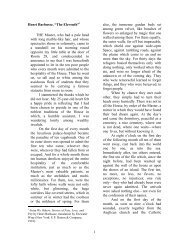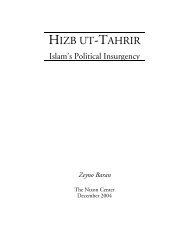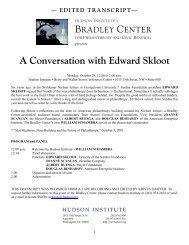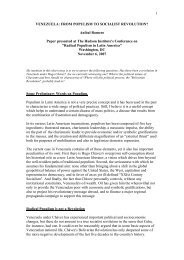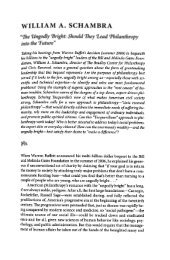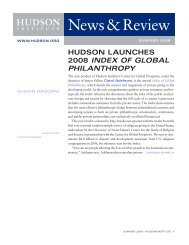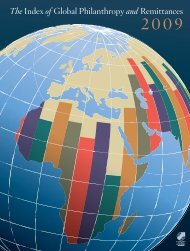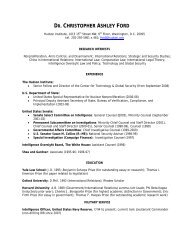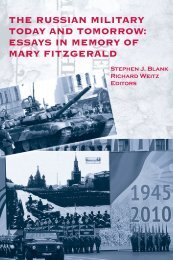NEW PLAYERS IN THE MEDITERRANEAN - German Marshall ...
NEW PLAYERS IN THE MEDITERRANEAN - German Marshall ...
NEW PLAYERS IN THE MEDITERRANEAN - German Marshall ...
You also want an ePaper? Increase the reach of your titles
YUMPU automatically turns print PDFs into web optimized ePapers that Google loves.
adical Islamists in the North Caucasus and with<br />
terrorism within and beyond that region, and<br />
Israel’s longstanding concerns about terrorism, have<br />
led to intelligence cooperation. The emergence of<br />
Avigdor Lieberman’s Israel Beitenu party, whose<br />
base is Russian-speaking Israelis (who have<br />
personal ties to Russia and tend to have a favorable<br />
view of Putin’s government), the expansion of<br />
trade and investment ties, Russia’s interest in<br />
Israeli technology, and both sides’ removal of visa<br />
restrictions (which has eased the volume of travel<br />
between Russia and Israel), have, in combination,<br />
transformed the political environment. Both sides<br />
now have a stake in a productive relationship.<br />
The same pragmatic approach that Russia takes<br />
toward Israel is evident in its policies elsewhere<br />
in the Mediterranean region. Consider Russia’s<br />
approach to Egypt. From 1954 (the year of the<br />
Soviet-backed Czechoslovak arms deal with<br />
Nasser’s Egypt) to the late 1970s, the Soviet Union<br />
was Egypt’s principal source of weaponry and its<br />
main political patron; and the Soviet military had<br />
access to Egyptian airfields and ports. But once<br />
Anwar Sadat effectively broke with the USSR,<br />
signed the 1978 U.S.-mediated Camp David treaty<br />
with Israel, and aligned Egypt with the United<br />
States, the Kremlin’s position in this pivotal Arab<br />
country lay in tatters. Not much was done to regain<br />
Russia’s foothold in Egypt under Gorbachev and<br />
Yeltsin given Russia’s weaknesses. But this changed<br />
with the advent of Putin. A flurry of top-level<br />
visits began between the two countries: Russian<br />
Foreign Minister Igor Ivanov visited Moscow in<br />
2000; Egyptian President Hosni Mubarak visited<br />
Moscow in 2001 and 2006; and Ivanov’s successor,<br />
Sergei Lavrov, arrived in Egypt in 2004 and laid<br />
the groundwork for the visits to Cairo of Prime<br />
Minister Mikhail Fradkov in 2004 and President<br />
Putin in 2005. The frequency of these high-level<br />
trips, and the signing of a Declaration of Friendship<br />
and Cooperation in 2002, demonstrated that the<br />
Kremlin was determined to reestablish Russia’s<br />
position in Egypt. 10 During his visit, Putin, the first<br />
Soviet/Russian president to go to Cairo in 40 years,<br />
sought to appeal to Egypt’s sense of its centrality<br />
in the Middle East by proposing that it should<br />
join the Quartet (which consist of the United<br />
States, Russia, the EU, and the UN) to play a “vital<br />
role” in advancing the Arab-Israeli peace process.<br />
Mubarak, for his part, urged Putin to seek a third<br />
term, notwithstanding that such a move would have<br />
violated the Russian constitution. 11<br />
Russian diplomacy has been no less active in<br />
another key Mediterranean state, Turkey. Here<br />
again, the pattern of high-level visits underscores<br />
the seriousness of the effort. During Boris Yeltsin’s<br />
presidency, apart from Prime Minister Viktor<br />
Chernomyrdin’s visit to Ankara in 1997, the<br />
Kremlin did little to demonstrate that Turkey was<br />
high on its list of foreign policy priorities. As with<br />
Egypt, the advent of Putin changed things. Putin<br />
made two visits to Ankara: in December 2004<br />
(the first by a Russian president in 32 years, the<br />
Turkish media were quick to note) and as prime<br />
minister in August 2009. And President Dmitry<br />
Medvedev visited Ankara in May 2010: The visits<br />
by top Russian officials have been reciprocated by<br />
the Turks: Prime Minister Recep Tayyip Erdogan<br />
visited Moscow in 2002, 2005, and 2010, and<br />
Foreign Minister Ahmet Davutoglu and President<br />
Abdullah Gul did so separately in 2009. The<br />
tensions between Ankara and Washington over<br />
the American war in Iraq, and the sharp rise in<br />
anti-American sentiment in Turkey that followed,<br />
led many Turks to admire Putin’s willingness to<br />
stand up to the United States. The notion that<br />
Russia could provide Ankara with an alternative<br />
10<br />
Antonio Sánchez Andrés, “Political-Economic Relations<br />
between Russia and North Africa,” Working Paper, Real Instituto<br />
Elcano, July 11, 2006, p. 7.<br />
11<br />
“Egypt and Russia to Strengthen Ties,” BBC News, November<br />
2, 2006, at http://news.bbc.co.uk/2/hi/europe/6109192.stm.<br />
New Players in the Mediterranean 11


